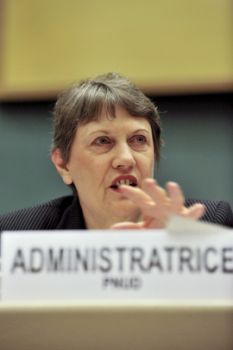By Claudia Ciobanu
RIO DE JANEIRO, Jun 22 (TerraViva) “With volunteers, we will drive sustainable development forward.” These were the words of Helen Clark, administrator of the United Nations Development Programme, at the close of Rio+20 on Jun 22.
Clark was speaking at an event where municipalities, businesses and development banks announced voluntary commitments made in Rio.
While critics accuse the Rio final declaration of being merely empty words, some of the main actors involved in the negotiations organised a press conference on the last day of the summit to showcase “actions for the road ahead” that were agreed upon here.
The actions are to be included in a “registry of commitments” attached to the final Rio declaration, whose implementation the U.N. will follow up on.
According to Sha Zukang, secretary-general of the Rio conference, “from the very beginning, Rio+20 was supposed to be about implementation, about action” and “voluntary commitments are a major part of this conference, complementing the outcomes of the official negotiations.”
He said that 692 registered commitments are included in the final Rio agreement, amounting to 513 billion dollars.
What do these commitments look like? Jose Maria Figueres, a former Costa Rican president and current chair of the non-profit Carbon War Room, explained that his organisation signed a memorandum of understanding with Aruba to help the country take action to phase out fossil fuels by 2020.
Additionally, Figueres’s organisation will work to mobilise one billion dollars to be invested in energy efficiency in buildings. Figueres gave no details on how the money would be raised or spent.
Addressing Zukang and referring to the outcome document of the Rio+20 conference, Figueres said, “Those who have failed you, Mr. Sha, are the governments, not the CEOs (chief executive officers), not the NGOs.”
(During this statement, two activists stepped in front of the panel screaming that the speakers “do not represent them”. They were immediately removed from the room by security forces.)
Another example of a voluntary commitment made in Rio was given by Bindu Lohani, president of the Asian Development Bank, who reminded media that eight development banks have committed to investing 175 billion dollars for sustainable transport in developing countries.
Clearly proud of this amount, Lohani added, “If you want to know more about this commitment, just Google 175 billion, it will show up.”
Other commitments included 45 chief financial officers announcing their companies will adhere to sustainable water management principles, 200 businesses committing to sustainable practices, more than 250 academic institutions from 50 countries announcing they would reshape their curricula to include sustainable development education, and over 200 cities promising to make plans for and invest in climate action.
Possibly in an effort to convince the audience that voluntary commitments do matter, Clark invited a Jamaican volunteer worker to speak about her achievements on the ground in social and environmental improvements.
Clark concluded, “Someone said that without volunteers, the world will stop. Here, with volunteers, we will drive sustainable development forward.”
The voluntary commitments by businesses, municipalities, development banks, governments and international organisations are one of the outcomes of Rio that has been praised by commentators. In the absence of a final document that is strong and detailed, some place hope in individual initiatives.
But considering that negotiators at Rio could not agree on a proposed annual 30-billion-dollar fund for sustainable development, the amount of 513 billion dollars in voluntary commitments appears optimistic, particularly given the lack of details around the various amounts of money put forward.
And the strong praise for voluntary action during this event rang a little hollow considering that none of the speakers made any reference to the Cupula dos Povos, where civil society, the home of volunteering, gathered during Rio+20 to exchange experiences, share practices and also plan for a better world.








 Add to Google
Add to Google







